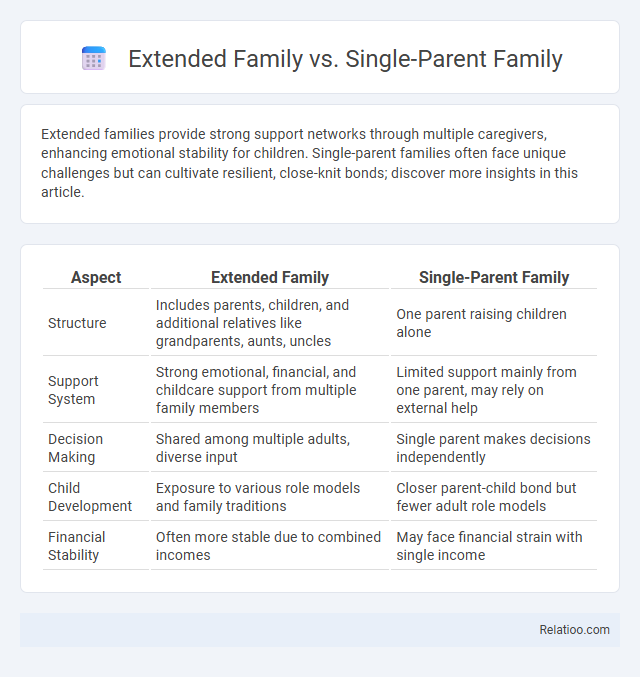Extended families provide strong support networks through multiple caregivers, enhancing emotional stability for children. Single-parent families often face unique challenges but can cultivate resilient, close-knit bonds; discover more insights in this article.
Table of Comparison
| Aspect | Extended Family | Single-Parent Family |
|---|---|---|
| Structure | Includes parents, children, and additional relatives like grandparents, aunts, uncles | One parent raising children alone |
| Support System | Strong emotional, financial, and childcare support from multiple family members | Limited support mainly from one parent, may rely on external help |
| Decision Making | Shared among multiple adults, diverse input | Single parent makes decisions independently |
| Child Development | Exposure to various role models and family traditions | Closer parent-child bond but fewer adult role models |
| Financial Stability | Often more stable due to combined incomes | May face financial strain with single income |
Understanding Extended Families
Understanding extended families involves recognizing their structure, which includes multiple generations or relatives beyond the nuclear family, such as grandparents, aunts, uncles, and cousins living together or maintaining close connections. Unlike single-parent families, where one adult raises the children, extended families offer a broader support network that can provide emotional, financial, and caregiving resources. You benefit from the diverse roles and shared responsibilities within extended families, fostering resilience and cultural continuity.
Defining Single-Parent Families
Single-parent families are defined by the presence of one parent raising one or more children without the support of a co-parent in the household, distinguishing them from extended families that include multiple generations or relatives living together. Your experience in a single-parent family may involve unique challenges related to balancing parental responsibilities and household management alone, unlike the shared duties typical in extended family structures. Research highlights that these families often develop strong bonds and resilience through adaptive coping strategies despite potential economic and social stressors.
Historical Context of Family Structures
Historical context reveals that extended families were the dominant family structure in many cultures, providing social, economic, and emotional support through multigenerational households. Single-parent families became more prevalent during industrialization and urbanization due to economic shifts and changing social norms, impacting caregiving dynamics and resource allocation. Understanding these historical trends helps you appreciate how family roles and support systems have evolved over time to meet diverse societal needs.
Emotional Support Systems
Extended families provide robust emotional support systems through multiple generations living together or maintaining close ties, offering a broad network of caregivers and confidants. Single-parent families often rely on external support networks such as friends, community groups, or counseling services to compensate for the limited in-home emotional resources. Your emotional well-being benefits differently depending on the structure, with extended families fostering collective resilience and single-parent families emphasizing individual coping skills and external support.
Economic Stability and Resources
Extended families often exhibit greater economic stability due to pooled financial resources, shared housing costs, and collective support systems, which can alleviate individual burdens. Single-parent families typically face more economic challenges, relying on a single income that may limit access to resources such as healthcare, education, and childcare. Extended families leverage combined incomes, varied skill sets, and intergenerational assistance, enhancing financial resilience and access to essential resources compared to single-parent households.
Child Development and Well-Being
Extended families provide children with diverse role models and emotional support from multiple adults, enhancing social skills and resilience. Single-parent families may face resource constraints but often foster strong parent-child bonds and adaptability in children. Your child's development benefits most from stable, nurturing environments regardless of family structure, with emphasis on consistent emotional support and positive communication.
Role of Cultural and Social Norms
Cultural and social norms significantly shape the dynamics within extended families and single-parent families, influencing caregiving roles, decision-making, and support systems. In extended families, cultural expectations often emphasize collective responsibility, fostering intergenerational support and resource sharing, while single-parent families may face societal pressures related to traditional family structures and parental roles. Variations in norms across societies impact the acceptance, resilience, and resources available to each family type, affecting children's socialization and emotional well-being.
Challenges Faced by Each Family Type
Extended families often face challenges related to resource allocation and privacy due to the larger number of members sharing space and responsibilities. Single-parent families typically encounter financial strain and limited time for child-rearing, impacting both economic stability and emotional support. Nuclear families may struggle with balancing work-life demands and providing adequate care without the buffering support of extended relatives.
Benefits of Extended and Single-Parent Families
Extended families provide a rich support network, offering emotional stability and shared resources that benefit children's development. Single-parent families foster strong bonds and resilience, encouraging independence and adaptability in both parents and children. Your choice between family structures influences the type of support and growth opportunities available within your household.
Future Trends in Family Dynamics
Future trends in family dynamics indicate a rise in diverse family structures, with extended families gaining prominence due to economic and caregiving advantages. Single-parent families are expected to increase, driven by shifting societal norms and greater acceptance of varied parenting roles. Your understanding of these evolving patterns can help in adapting support systems that foster stability and resilience across different family types.

Infographic: Extended Family vs Single-Parent Family
 relatioo.com
relatioo.com